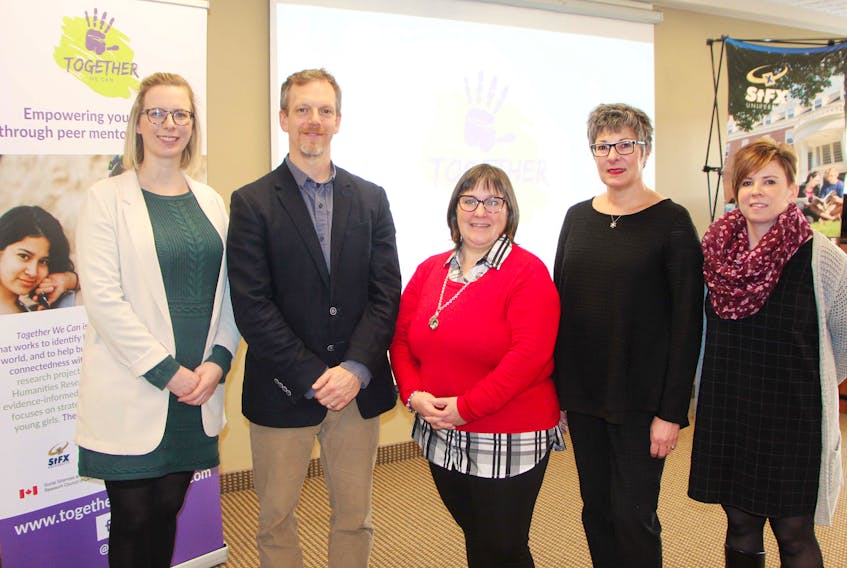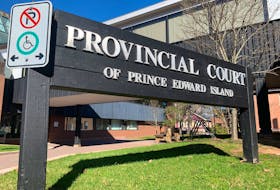ANTIGONISH, N.S. - Together We Can, and together they did.
On Dec. 5, Together We Can, the result of a three-year project led by St. F.X. and New Brunswick Community College (NBCC), which aimed to increase pro-social skills and positive identity in adolescent girls, was officially launched at St. F.X.
A release to accompany the launch talked more about the project.
“It provides strategies aimed at improving girls’ positive identities that are proven to address critical issues.
“The project utilized St. F.X. Bachelor of Education students and NBCC licensed practical nursing students, as well as staff from the Antigonish Women’s Resource Centre (AWRC) to act as peer mentors and deliver workshops to girls in grade 7 and 8.
“These workshops included activities and encouraged conversations on a variety of topics. The peer mentors worked with schools in the Strait Regional Centre for Education (SRCE) and schools in rural New Brunswick. The overall aim was to improve pro-social skills and positive identity in girls … and it was successful.”
Stephanie Ruckstuhl, a registered nurse and faculty member at NBCC with the practical nursing and allied health programs, started the program after seeing research which showed the severe drop-off in positive identification numbers for girls in Canada, between Grade 6 and Grade 9.
“Yes and no,” she said when asked if she could have envisioned it growing to the point it has, with help from funding through the Social Sciences and Humanities Research Council of Canada.
“Yes, I was hoping [for the growth] but, no, that is like dreaming of unicorns, right. You think of it but you think of it as the same action result as if you were going to have a unicorn show up in your backyard. So to see it in fruition; that a Nova Scotia [regional centre for education] is taking it on and our school board will present it at their provincial conference to take it on as well, is outstanding. To know that you do research and it’s going to have an impact that will, hopefully, be long lasting, it’s wonderful.”
Amongst those who spoke at the launch was Wanda Fougere, co-ordinator of programs and policy with SRCE.
“Given the mental health and inclusion priorities of both the Department of Education and Early Childhood Development and the Strait Regional Centre for Education, this program is exactly the kind of intervention needed to help fulfill the goals outlined in the SRCE business plan and mental health strategy,” she said, reading from a prepared speech.
“Through the success realized in two pilot schools in the 2017-18 school year, we plan to continue this partnership and offer it to a broader audience throughout this school year. Additionally, we will be working towards increasing capacity with our guidance and other specialist staff to offer similar gender specific programming to all students.”

Ruckstuhl, as well as St. F.X. associate professor in the Faculty of Education Christopher Gilham, who coordinated the program for St. F.X., and Faye Fraser, who facilitated from her position with the AWRC at the time, spoke at the launch and we’re asked, afterwards, what the message is going forward.
“We need to take a stronger look at our schools and get them to take a stronger look at mental health and to make sure our girls have the tools they need to go through adolescence with strength and pride,” Ruckstuhl said.
“It has been recognized by both the Department of Health and Wellness and the Department of Education as an evidenced based program,” Gilham said. “The Strait region, at least, is taking it up in earnest, and we want more people to take it up.
“We would like to see the whole Maritimes pick it up; different school boards,” he added.
“We are mailing out to administrators at schools directly across the provinces.”
“Just getting the message out that this program is evidence based and it can be really impactful and powerful for girls,” Fraser said.
“In our local area, there will be some capacity building in terms of staff who will be able to deliver the program,” she added, noting information on who can deliver the program and the curriculum is on the website togetherwecangirls.com.
There was a lot of talk about how the program’s success can be attributed to the fact it broke through the different clicks girls start to trend towards around the age group. About how some support groups, unfortunately, end up adding to stigmas because they tend to attract a particular demographic.
Gilham, as he closed his remarks, noted a similar program for boys should be established.
“That’s the whole goal,” he said.
“For example, when at the end, Faye shared that when the girls were talking about menstruation and how that was getting to be known in the schools, the boys were teasing them and saying things like ‘yuck,’ ‘gross.’ Of course, that’s our job as men, as role models, to say to boys, that’s not OK and we need to understand this so we don’t make girls feel that way. That’s the work the needs to be done; right now the weight is all on the girls.”









